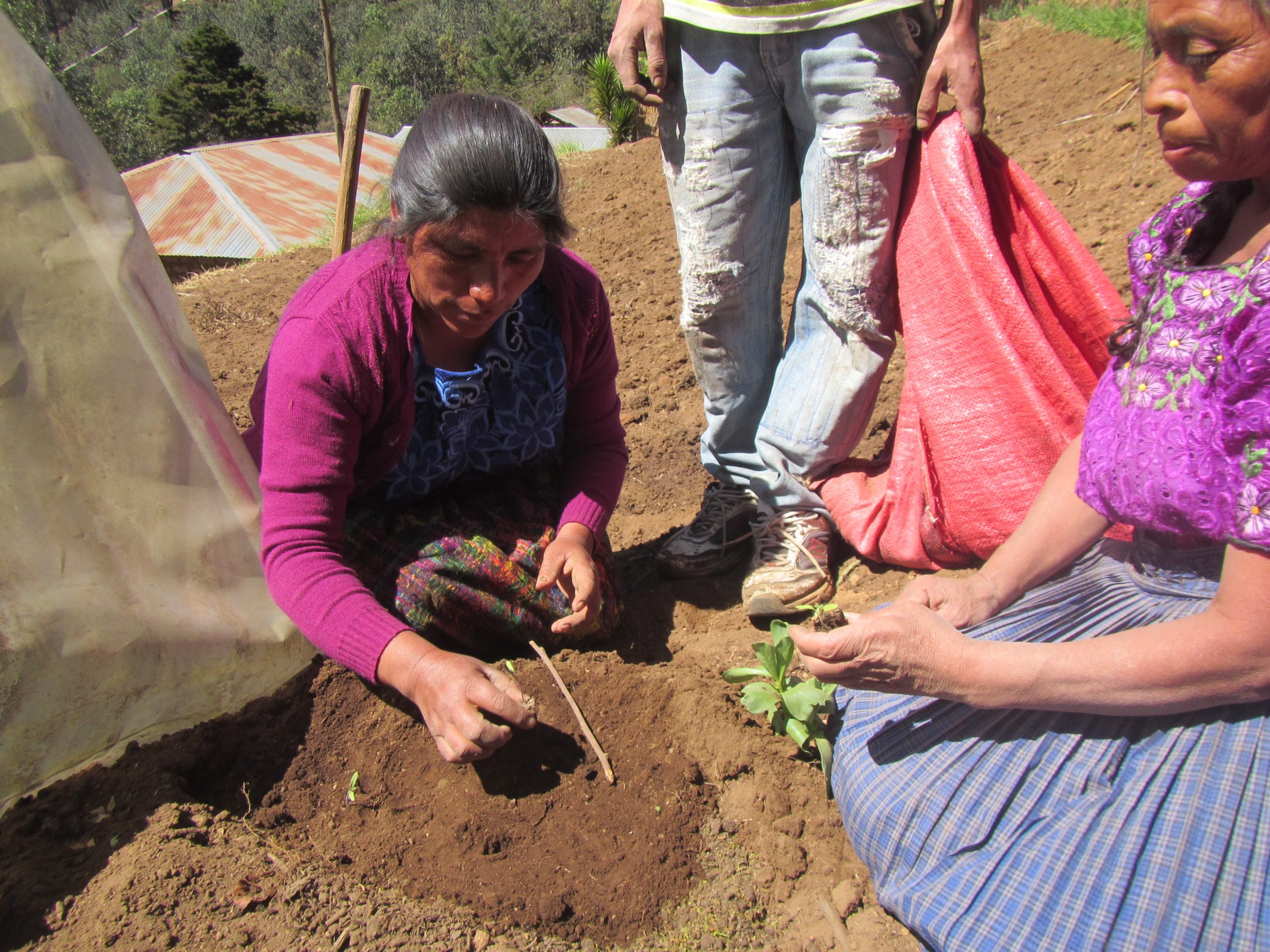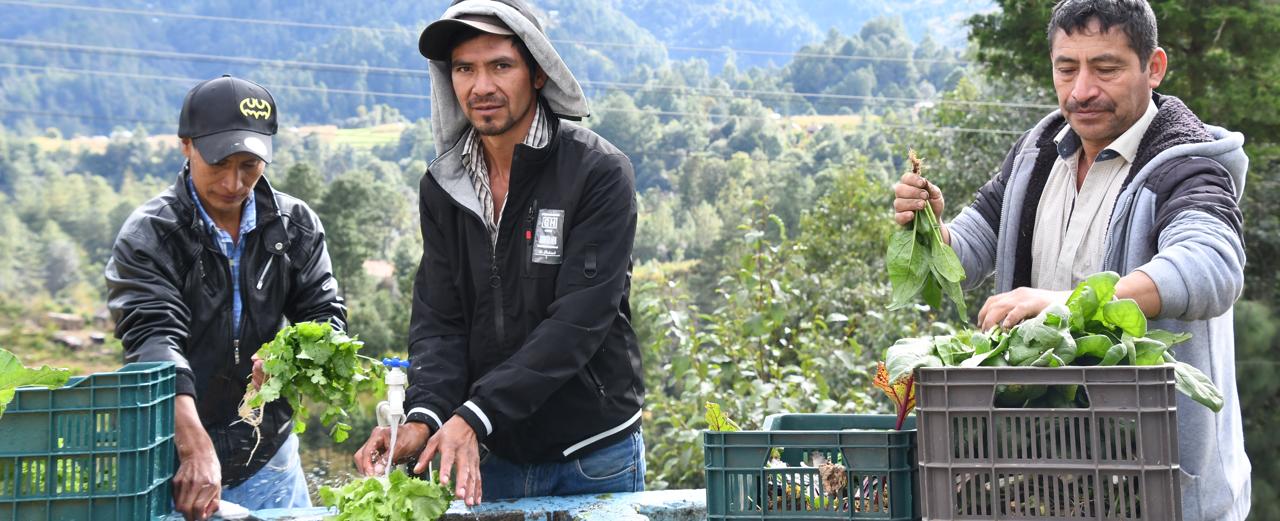 Sow the future, protect the climate!
Sow the future, protect the climate!
Wholesome food for smallholder families in Guatemala
Storms, droughts, floods - for years, the people who have suffered most from the consequences of climate change have been the very people who contribute least: small farming families from the Global South. This particularly includes countries in Asia, Africa and Central and South America. "Hardly a year passes in which we are not affected," says Cristina Crúz, an indigenous smallholder who lives in the Central American state of Guatemala. In 2019 there was another severe drought there, which destroyed over 42,000 hectares of maize. As the main ingredient in tortillas, maize is the most important staple food in the country and no meal should be without it. In addition, the grain plays an important role in traditional rituals of the Mayan culture that is still alive today. Around 70 per cent of the population in the western highlands of Guatemala are indigenous Maya people of the Quiché, Mam and Kakchiquel peoples. Each of them speaks their own languages and has their own customs and identities.
Necessity
Reliable harvests and wholesome food for indigenous smallholder families from remote highland communities in Guatemala.
Activity
Smallholder families receive seeds, agricultural tools and further training in agro-ecology and in the cultivation of vegetable plants.
Countable effort
Number of vegetable plants grown and yield per plant.
Result
Greater variety and year-round availability of food makes it possible to have a balanced, wholesome diet and to sell surplus food.
Systemic effect
Improved resilience of agricultural output to the effects of climate change, increased food security and reduction of poverty among smallholder families.
Background
The maize stores of Cristina Crúz and her family are slowly running low. In 2019, the rainy season in her village of Xeabaj in the western highlands of Guatemala has once again been far too short. As a result, most of the maize plants have withered away. This is a hard blow for Cristina, her husband and their seven children. “We have to survive with what we harvest,” says Cristina. In recent years, they have repeatedly lost large parts of their crops. “There used to be little streams here, but now they have dried up. Our harvests are getting worse every year.”
Like Cristina, most of the smallholder families in the remote highland communities are in the same situation. The increasingly severe droughts are threatening their existence: Up to 80 per cent of the children in the region are malnourished (Kruchem, 2016). Against this backdrop, local non-governmental organisations see agro-ecology as a promising alternative for the sustainable support of the people. The concept of agro-ecology includes, in particular, environmentally friendly farming methods, the cultivation of a variety of crops and closed production cycles in agriculture. By dispensing with chemical fertilisers and pesticides, agro-ecology protects the soil, promotes biodiversity and reduces emissions of greenhouse gases such as carbon dioxide. Cereals, vegetables, fruits and herbs are grown on very small plots of land. This diversity has a positive effect on family health and makes it easier to compensate for crop losses.
The good deed
With today's good deed you will support 357 smallholder families in Guatemala and help them to grow healthy vegetables. During the course of the project, the families receive close supervision through training in organic farming methods and the provision of additional tools. This gives them everything they need to grow a vegetable plant from seed, even during droughts or storms: Seeds, agricultural tools such as utensils, fertiliser or water as well as practical training on agro-ecology and adaptation to climate change. The smallholders reproduce their products and thus secure their food supply.

AboutGuatemala
Guatemala City
Capital
16.604.030
Number of inhabitants
7.378 $
Gross domestic product per capita per year
Placed 126th out of 189
Human Development Index
Guatemala has one of the highest rates of malnutrition among children anywhere in the world and is the country in Central America most affected by extreme weather events (Germanwatch, 2020).
About the organization and further information
Association
INKOTA-netzwerk e.V.
Berliner Tranzparenzcharta des Berliner Senats


Further information and source
- Bassermann, L., 2019. Zeit für den Wandel. Ohne Agrarökologie kann es keine nachhaltigen und gerechten Ernährungssysteme geben, in: Südlink 189, Agrarökologie: Wege in die Landwirtschaft der Zukunft, INKOTA-netzwerk, Berlin.
- El Economista, 26.08.2019: La sequía afectó a 50,000 familias y dañó 42,000 hectáreas en Guatemala.
- Germanwatch, 2020. Globaler Klima-Risiko-Index 2020, Bonn.
- Kruchem, T., 04.08.2016. Mangelernährung in Guatemala: Die verhängnisvolle Tradition der Maya, Deutschlandfunk Kultur, Köln.
- Nordhausen, I., 2018. Zuverlässige Ernte und gesundes Essen: Agrarökologie und nachhaltige Vermarktung stärken indigene kleinbäuerliche Familien in Guatemala, INKOTA-netzwerk, Berlin.




